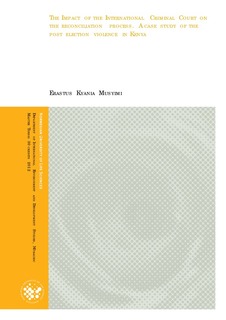| dc.description.abstract | In their endeavor to pursue justice in the post-conflict period, the ICC operations in Africa
have been met with significant challenges. While it has been acknowledged in some quarters
that the ICC can excel in curbing the problems of violence stemming from a culture of
impunity, the court has attracted immense and tremendous controversy especially in its
propensity for prolonging conflict and undermining peace deals and reconciliation processes
that have proved imperative in a society emerging from a period of gross human rights
violations.
Taking the Kenyan post-election violence of 2007/2008 as the case study, the study explores
whether the ICC can promote reconciliation and an inclusive political community through
retributive justice. The study further seeks the opinions of direct victims of the post election
violence on the role of the ICC in administering transitional justice through punitive
measures. Included as well are the views of various stakeholders, mostly in Nairobi and Oslo,
on the ICC’s mandate to end the culture of impunity and its impact on reconciliation process
in Kenya. The qualitative case study employs interviews and focus group discussions as the
data collection tools to obtain the opinions and views of these respondents.
I argue that despite the ICC being considered as a legitimate and necessary institution to fight
impunity, it falls short of realizing its full potential to progressively promote reconciliation,
peace and stability in the country. This is seen as a result of local and international politics
engulfing the court, its structural make-up, and its emphasis on retributive justice which pays
little regard to the national healing and reconciliation.
The study is quite timely considering that, at the time of writing (November 2012), Kenya is
about to go to the polls and some of the presidential candidates are waiting for their trials at
almost the same time as the election period. The coincidence of the two crucial events is
evidently going to generate anxiety and thus it requires a mechanism that would ensure the
fragile peace currently being enjoyed is not jeopardized. | no_NO |
